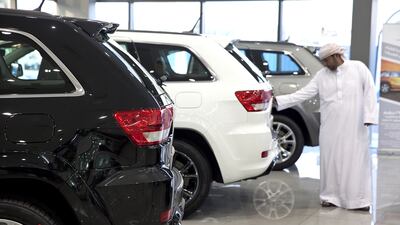Car sales in the GCC are expected to increase at a much slower rate this year compared with the double-digit jump of 2014, as consistently lower oil prices put the brakes on economic growth.
Data from the consultancy IHS Automotive show that first-half sales in the GCC were 890,000 units. Overall sales this year are expected to reach about 1.88 million units compared with 1.78 million last year – a growth of 5.6 per cent.
“The market is growing but not at the rate seen last year,” said Pierluigi Bellini, manager for the Middle East and Africa at IHS Automotive. “We have seen varied performance across the region.”
Oil prices have fallen by more than half since June last year and have been hovering around the $60 mark in recent months.
As a result, the IMF has revised growth forecasts lower for the UAE and Saudi Arabia in the past few months. The UAE’s GDP growth of about 4.2 per cent last year is expected to slow to 3.2 per cent this year. Saudi Arabia, which gets nearly 88 per cent of its revenue from crude exports, will grow 3 per cent this year compared with 3.6 per cent last year.
According to IHS Automotive, the UAE led the region in car sales growth during the first half of this year at 3.5 per cent compared with last year. Saudi Arabia followed at about 3.2 per cent, while Kuwait barely showed gains of about 1 per cent. Oman, meanwhile, was the only country to record negative growth.
“Oman is a one of the major re-exporting hubs in the region. Some of the countries to which these cars are redirected have experienced economic slowdown because of insurgency and some other factors,” Mr Bellini said.
Average growth across the GCC in the first half of this year was more than 3 per cent, “which is still good considering the drop in oil prices”, Mr Bellini said.
Ramadan, which this year straddled June and July, generally provides a boost to sales. It is traditionally the best period of the year for dealers as buyers take advantage of incentives ranging from cash discounts to extended warranties and service packages.
Al Masaood Automobiles, the Nissan dealer for Abu Dhabi, said sales doubled during the holy month.
In May the Japanese car dealer reported bumper sales in the Middle East during the 2014-15 financial year. The bonus King Salman distributed among government employees in January resulted in Saudi citizens splurging on new cars, Nissan said.
Samir Cherfan, Nissan Middle East’s managing director, said that he expects to sell 80,000 cars this year and does not expect industry volumes in the kingdom to decline this year despite the drop in oil prices.
The German luxury car maker BMW last week said sales in the Middle East – comprising 12 markets – increased 6 per cent to 16,700 from a year earlier.
The US car maker GM reported a 21 per cent increase in sales in the Middle East in June, which was led by strong growth in the UAE, Oman and Qatar.
Ford said it sold 39,600 vehicles in the first half of the year in the region, up 2 per cent from the same period last year.
Hyundai, meanwhile, said sales rose 1 per cent year-on-year in the first half to 171,000 units.
Addressing the impact of the deregulation of oil prices in the UAE from next month, Mr Bellini said that an increase in petrol prices will have only a marginal impact on sales in the beginning. “The government will be determining pump prices. When they fully liberalise prices you might have a negative impact on sales. It is a win-win situation for the UAE – they save on subsidies and export more oil.”
According to the IMF, fuel subsidies cost the UAE about $29 billion and nearly $9bn on petroleum products alone.
However, car sales growth is expected to bounce back in two years’ time. “Oil is expected to average between $60-$70 a barrel in 2016. You might see bit of a slowdown but will continue to grow as oil returns to $100,” Mr Bellini said.
siyer@thenational.ae
Follow The National's Business section on Twitter

